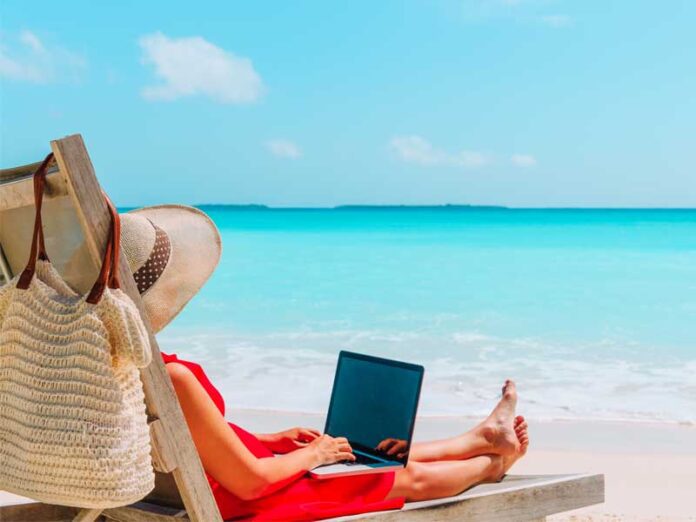Bleisure travel, the blending of business and leisure trips into one getaway, has become an increasingly popular trend in recent years. With flexible remote work policies, many professionals can now extend business trips to enjoy vacation activities at the destination. This blog explores the growth of bleisure travel and how it is changing business trips and the tourism industry.
Changing Nature of Business Travel
Traditionally, work-related travel was limited to the dates and activities required for the business purpose. But with remote and hybrid work arrangements becoming more common across companies, business trips can be approached differently today. Employees may no longer need to rigidly adhere to the same travel schedule and agenda.
Many professionals can now conduct meetings or work remotely from a business trip destination before or after the primary on-site obligations. This provides new opportunities to explore the location as a tourist outside of pure business commitments. The rise of bleisure reflects greater flexibility in blending remote work with business travel.
Extending Trips for Leisure
The core benefit of bleisure travel is the ability to tack on vacation time to a work trip without paying for additional flights. For example, an employee attending a Monday-Thursday conference in Miami could stay through Sunday to enjoy the beaches and nightlife. Having flights and accommodation already covered makes leisure additions affordable.
Digital nomads may even spend weeks or months living in an area if their work can be performed remotely. Bleisure travelers take advantage of the rare chance to already be situated in an appealing destination away from home. Extending trips enables deeper immersion into the regional culture beyond a whirlwind business visit.
Solo Bleisure on the Rise
While any employee can participate in bleisure travel, solo business travelers without family obligations are among the most active bleisure adopters. According to research by Expedia, solo bleisure trips increased globally by 178% in 2022 compared to before the pandemic. For single workers, bleisure provides rewarding opportunities to explore exciting destinations alone.
Traveling solo allows for greater flexibility and spontaneity in choosing leisure activities of personal interest without compromising for others. Solo bleisure travelers cite escapism, cultural immersion, rest, and new social connections as major motivations. The solo bleisure trend also speaks to employee demand for richer travel experiences.
Popularity Across Generations
Bleisure appeals across generations, from Baby Boomers to Millennials and Gen Z. Expedia found that Boomers were the most likely to extend business trips in 2022, signaling an appetite for leisure and cultural activities among older travelers. Millennials were not far behind Boomers, reflecting their passion for new adventures.
Younger generations who tend to blend work and life more fluidly are also eager bleisure participants. Since social media and remote work opportunities enable Gen Z to work anywhere, they leverage business travel to also fulfill their wanderlust. Overall, blending work with play resonates strongly across age groups.
Return of the “Digital Nomad Visa”
To cater to location-independent workers combining remote work with travel, more destinations are launching digital nomad visas. These visas allow people to live in and work remotely from a country for months or even years at a time. Popular spots like Costa Rica, Dubai, and Thailand have implemented digital nomad programs.
The visas offer legal long-term stays that facilitate the bleisure lifestyle. Professionals can soak in a culture like learning Spanish in Costa Rica while working flexibly. Destinations benefit by attracting talent and tourism revenue. More countries launching digital nomad visas could further accelerate bleisure adoption.
Sustainability Considerations
However, sustainability issues associated with frequent travel prevent some eco-conscious travelers from fully embracing the bleisure trend. Air travel leaves a significant carbon footprint that contributes to climate change, especially for frequent long-haul flights. Bleisure travelers aiming to trip extend should consider lower-impact transport options like trains or alternate destinations closer to home requiring shorter flights.
Destinations can also incentivize greener practices by offering discounts on sustainable hotels and transportation. Being mindful of sustainability helps balance bleisure’s benefits for travelers with its environmental impact.
Bleisure Hotels on the Rise
Recognizing the growth in demand for bleisure travel, more hotels are now catering their amenities and spaces specifically to blend work and play. Brands like Marriott and Hilton have introduced bleisure hotel packages providing benefits like free Wi-Fi, remote working spaces, office equipment rentals and discounted late check-out.
On-site cafes, rooftop lounges, fitness centers and evening social events give solo bleisure guests opportunities to be social and enjoy relaxing leisure activities after work obligations. Purpose-built bleisure hotels maximize the experience of integrating work with vacation.
Risks and Drawbacks
However, bleisure travel does come with certain risks and drawbacks to consider. Extending trips abroad can get expensive if not budgeted carefully for additional costs like food, lodging, and activities. Employers may also frown upon excessive bleisure travel that cuts into productivity. Frequent trips also increase chances for travel mishaps.
Bleisure travelers report sometimes feeling pressured to overextend themselves participating in activities after exhausting work commitments. Finding the right balance is important to avoid burnout. Being clear on boundaries and priorities allows bleisure travelers to maximize benefits while minimizing risks.
The Future of Bleisure
Bleisure travel looks likely to become even more popular as flexible remote work policies persist after the pandemic. Professionals will seek to capitalize on trips already required for business to enjoy new leisure experiences. Companies will also likely leverage bleisure benefits like morale and recruitment in shaping travel policies.
As sustainability challenges are addressed and workplace cultures evolve, the ease of blending work, travel and play through bleisure will be increasingly appealing. Destinations and hotels will cater experiences to bleachsiers. While risks remain, bleisure travel can offer huge benefits if executed strategically.
Conclusion
Bleisure travel represents an exciting shift in business trips becoming more fluid with added flexibility for leisure. Employees are now empowered to blend remote work with vacation once reaching a destination for business. This benefits companies through increased worker satisfaction and destinations through tourist spending. Moving forward, expect bleisure to feature prominently as a travel trend that integrates the evolving future of remote work.










